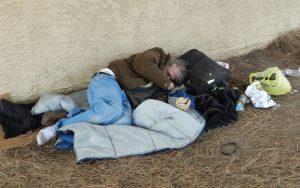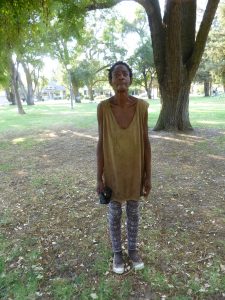
Though political resistance to raising the minimum wage is a major factor in homelessness, it still gets little media attention. Consider this: A full-time job at today’s current minimum wage of $10 an hour would pay $1600 a month before taxes. As of July this year, average rent in Modesto is $1023 per month.
But when Governor Jerry Brown signed legislation raising the minimum wage last April, Valley political leaders were apoplectic. Assembly member Kristen Olsen said, “I have deep concerns about how this bill will impact people and families in California—especially in the San Joaquin Valley, where unemployment rates remain high and job opportunities are often few and far between.” Congressman Jeff Denham, of the Valley’s Tenth District, has a clear record of opposing minimum wage increases in general and has even voted against overtime pay for farm workers.
Do the math. Even at double the minimum wage, people can’t afford housing. And, per the legislation signed by the governor, the increase in California’s minimum wage escalates slowly over a five year period. In January, it rises to a whopping $10.50 an hour. Simple arithmetic tells us that using the common formula that rent should be around thirty percent of income, people making minimum wage can’t afford shelter.
Real factors in homelessness—outsourcing jobs, mental illness, cost of living increases, wage stagnation and others—are rarely cited. Instead, the entire issue has been clouded by a decades-long promotion of what is now a homeless mythology that continues to prevent real solutions to an escalating national crisis.
The Myth of Work
Among the most persistent narratives about people experiencing homelessness is the myth of work. “They don’t want to work” has become a constant refrain that offers a comfortable way both to explain homelessness and avoid any discussion of root causes. But when the cost of living rises and wages stagnate, there comes a point when working doesn’t make sense.
To many San Joaquin Valley residents, double minimum wage, at $20 an hour, sounds like good money until a person tries to stretch it into shelter, food, transportation, health care, clothing, utilities and all the other necessities. Today’s mythology says that if you can’t make it by working, it’s your fault, but when working at even double minimum age doesn’t enable people to even subsist, it’s not the people who are at fault, it’s the system. When builders admit it’s financially impossible to provide affordable housing, it’s not time to blame workers, it’s time to blame an economy that left workers behind.
After decades of union-busting, outsourcing, downsizing, automation, and wage stagnation, the American worker has gone from a proud member of the middle class to a shamed flunky in the service class. Flipping burgers, tending yards, and sweeping floors have too often become alternatives to good factory jobs. Along with the low pay, “service workers” lucky enough to land even these jobs have also gained the opportunity to be mocked and derided.
When hard work no longer provides enough for food, shelter, and family, the result is a loss of dignity, self-respect, and hope. Today’s American workers have become the scapegoat for decades of political decisions that left them working harder and harder for less and less.
The Myth of Choices
Milton Friedman’s Free to Choose was one of the intellectual lynchpins of the 1980s “Reagan Revolution.” Friedman’s paean to laissez faire economic policies ushered in an era when political leaders, conservative pundits, and talk-show hosts reduced the American Dream to an individualistic mix of hard work, family values, and “free” choice.
Ronald Reagan’s famous words, “Government is not the solution to our problem, government is the problem,” became a mantra that culminated in Bill Clinton’s 1996 announcement that, “The era of big government is over.”
In his first year in office alone, President Reagan cut government housing assistance funds by half. He also continued to promote the notion that homelessness is a matter of choice. By 1984, when the number of people experiencing homelessness had attracted national attention, Reagan famously said:
”What we have found in this country…even in the best of times, and that is the people who are sleeping on the grates, the homeless who are homeless, you might say, by choice.”
Even today, after the devastating effects of the global economy on American industry and workers, there is a widespread belief that homeless people choose to live on the streets. One of the most pernicious effects of such beliefs stems from the notion that all homeless people are alike. That notion fails immediately in the face of a few simple facts.

One of the most damning such facts is the large number of homeless people who are mentally ill. Some local experts estimate the rate of mental illness among our homeless population is at least forty percent.
Assuming that mentally ill people “choose” their condition isn’t just inhumane, it’s cruel. Their presence on the streets is the result of closing mental health institutions based on the false theory that modern drugs and home care would address their problems. Most of those closures also happened during the “Reagan Revolution.”
Many homeless people, mentally ill or not, do not “choose” to be out of work. Even conservative presidential candidate Ross Perot warned almost a quarter century ago about the “giant sucking sound” that would result from jobs lost due to the North American Free Trade Agreement (NAFTA). And NAFTA was on only the beginning of a massive corporate move away from American labor.
Today, the giants of American industry have “chosen” to employ millions of willing workers everywhere from Mexico to China. According to the prevailing mythology, the workers they left behind here in the United States have “chosen” to be poor or homeless.
Since Ronald Reagan’s 1984 proclamation that homelessness is a choice, the global economy has not only sucked away American jobs, it has wreaked havoc on income equality. With reduced labor and construction costs, investors and corporate executives have reaped huge profits while most of those who used to participate in economic growth have fallen farther and farther behind.
Rising profits in the hands of the favored few not only punished American workers, they led to a political system ever more dependent on huge campaign contributions. Until the recent wild card of advertising via social media, corporate donors routinely gamed elections by funding candidates who would make “choosing” available to fewer and fewer people. What was once a more equitable democratic republic became a plutocratic oligarchy where the myth of choice grew in inverse proportion to a harsh reality of diminishing options for the vast majority of American citizens.
Next: Part II: The Myths of Drugs, Government, and Family
